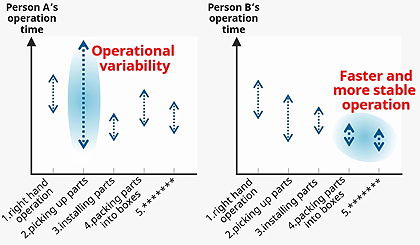This is believed to be the world's first application of a probabilistic generative tool to model repetitive physical actions in factories. Using a video of the worker, the tool detects their skeletal structure and records their physical movements as waveform data. It identifies and analyses the performance of repetitive tasks – such as moving an object, or tightening a screw – based on the time required to perform the task. It can also identify non-repetitive tasks.
The results can be incorporated into a video of the work being performed, allowing users to confirm each step of the task and assign labels, such as “screw tightening”. There is no need to create data to train the AI, thus reducing the time taken to analyse tasks by up to 99%. There is also no need to use high-performance computers and graphics processors. Accuracy is claimed to be at least 80% better than manual analysis of work performed by unskilled workers, and at least 90% better for work performed by experienced personnel.
One aim of the analysis is to help new workers to learn skills. However, to analyse the differences between work performed by new and experienced personnel, existing AI technologies require training data for each individual to be prepared in advance, which can involve considerable time and effort.
The new technology eliminates this need for training data, resulting in rapid analysis even when observing multiple workers. By making comparisons with experienced workers, the AI can identify differences to help inexperienced workers learn advanced skills. It can also choose the most representative examples of skilled and unskilled repetitive tasks in a video, enabling new personnel to grasp the differences at a glance and to accelerate their learning of advanced skills.

Mitsubishi’s AI-based work analysis tool can visualise variations between different workers performing the same task
Even if products or production processes change, real-time detection of abnormal processes can be achieved rapidly with minimal effort, helping to avoid quality problems.
Giving the background to the development, Mitsubishi says that while automation technology and know-how have advanced in recent years, capital investment has not kept pace, so many processes are still performed by hand. Human performance can vary in terms of time and quality, leading to manufacturing bottlenecks. To minimise such variations and to maintain quality, the time and methods required to perform tasks can be analysed to quantify and standardise tasks. However, manual analysis is time-consuming and labour-intensive. In response, efforts are being made to automate such analyses, including through the use of AI. But until now, the adoption of AI has been hampered by the need to create training data required by the AI to learn about differences between workers and processes. The new tool is intended to overcome this.
Mitsubishi plans to verify the new AI tool both internally and at external production sites, including plants operated by Sysmex and Sumitomo Rubber Industries, with the aim of launching a commercial product by March 2026 – or possibly later.
Mitsubishi Electric: LinkedIn Facebook

